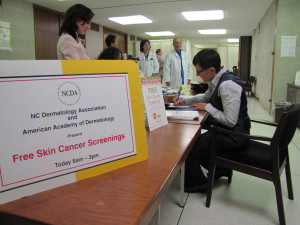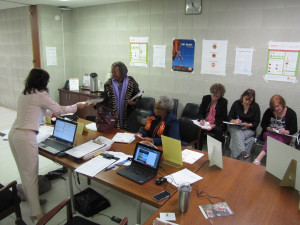
 The North Carolina Dermatology Association (NCDA) held its sixth annual skin screening for legislators, their staff and the public today, Wednesday, April 19, from 9 am until 3 pm. Nine dermatologists volunteered their time for the event.
The North Carolina Dermatology Association (NCDA) held its sixth annual skin screening for legislators, their staff and the public today, Wednesday, April 19, from 9 am until 3 pm. Nine dermatologists volunteered their time for the event.
“It’s a good opportunity to screen some skin. We pick up some suspicious lesions every year that we hope people will follow up on,” said Kevin Stein, MD, President of the NCDA and a dermatologist in Winston-Salem. After performing several surgeries in the morning, he spent most of his day at the Legislative Building. He has participated in the NCDA Skin Cancer Screening event for the past several years. “It’s also nice to meet the General Assembly members and put a name with a face,” he said.
The free screenings consisted of full-body or partial/extremity examinations (individual’s preference) by dermatologists, and teaching skin self-examination techniques. Volunteers also distributed skin cancer resources with information on identifying a dermatologist in the individuals’ communities.
Based on national statistics, one in five citizens will get skin cancer in their lifetime. One form of this disease, melanoma, will kill nearly 10,130 people this year; that means one American dies from melanoma almost every hour.
This preventive health care event is being conducted as a part of the NCDA’s education efforts regarding the risks of indoor tanning and sun exposure. More than 419,000 cases of skin cancer in the U.S. each year are linked to indoor tanning.
Fortunately, most skin cancers, including melanoma, can be effectively treated if detected early. But fewer than one-third of Americans examine their skin for signs of skin cancer, according to a survey by the American Academy of Dermatology.
Russell Kilpatrick, MD, a dermatologist with Physicians East in Greenville who has participated in every skin cancer screening event at the General Assembly since they began six years ago.
“It’s not a secret that another part of the reason we’re here is to make sure the legislators see our white coats and understand that we represent the medical community,” he said, adding that he had a few informal conversations with legislators and legislative staff about physician opposition to pending scope of practice legislation.

